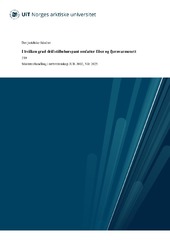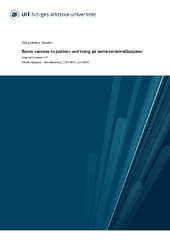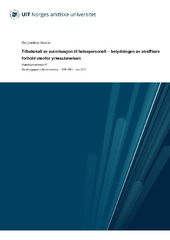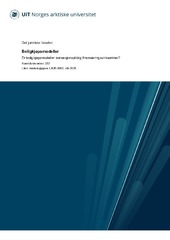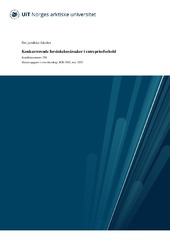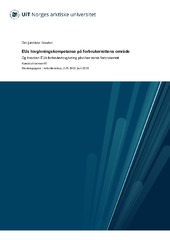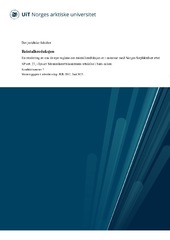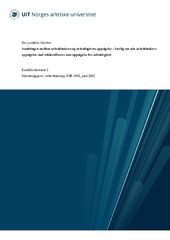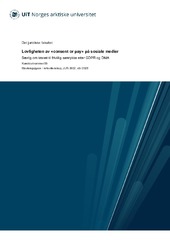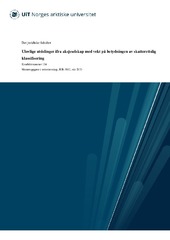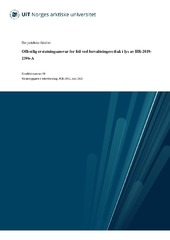Det juridiske fakultet: Recent submissions
Now showing items 1-20 of 1668
-
I hvilken grad driftstilbehørspant omfatter fiber og fjernvarmenett
(Master thesis, 2025)Temaet for avhandlingen er i hvilken grad driftstilbehørspant kan omfatte fiber- og fjernvarmenett nedgravd på andres eiendommer, under den forutsetning at fiber- og fjernvarmenettselskapet har en utinglyst servitutt på fremmed manns grunn. I forbindelse med utbygging av fiber- og fjernvarmekabler legges ofte kablene på grunn som omfattes av en privatpersons eiendomsrett. For å kunne legge kablene ... -
La Historia del Pueblo Chiquitano Narrada por el Río Tarumã: Un Relato Jurídico Co-creado con el Pueblo Chiquitano
(Book; Bok, 2025-08-07)Este libro es el resultado de un proyecto sobre diseño legal y derecho visual aplicado al caso de la contaminación del río Tarumã y reflexiones sobre el pueblo Chiquitano. Desarrollado como parte del taller ECO_CARE, cofinanciado por instituciones noruegas y la Universidad Ártica de Noruega, el proyecto promovió un enfoque colaborativo entre investigadores, estudiantes y la comunidad Chiquitana. La ... -
Ne bis in idem i personvernforordningen og KI-forordningen
(Master thesis, 2025)Avhandlingen vil analysere innholdet i ne bis in idem-prinsippet som det følger av Den Europeiske Unions pakt om fundamentale rettigheter artikkel 50 og EMK tilleggsprotokoll 7 artikkel 4. Det vil for hvert vilkår i prinsippet vurderes om innholdet er harmonisert. Deretter vil det vurderes om man kan lovlig parallellforfølge et forhold som medfører brudd med KI-forordningen og personvernforordningen ... -
Når kan det bestemmes at samvær skal "begrenses sterkt eller falle helt bort" etter barnevernsloven § 7-2 tredje ledd?
(Master thesis, 2025)Oppgaven behandler spørsmålet om når samvær kan «begrenses sterkt eller falle helt bort» etter barnevernsloven § 7-2 tredje ledd. Analyser av rettspraksis hvor samvær ble sterkt begrenset eller falt bort er en sentral del av oppgaven. Det foretas en vurdering av om mulighetene for å nekte eller begrense samværet mellom barn og foreldre i tilstrekkelig grad ivaretar de grunnleggende rettighetene som ... -
Barns «access to justice» ved tvang på barnevernsinstitusjoner
(Master thesis, 2025)Avhandlingen omhandler barns «access to justice» dersom de mener seg utsatt for ulovlig eller vilkårlig tvang. Fokuset for avhandlingen knytter seg til barn med alvorlige atferdsvansker som er tvangsplassert på barnevernsinstitusjon i medhold av barnevernsloven § 6-2. Likevel er flere av oppgavens drøftelser relevante også for andre barn. I avhandlingen drøftes først hva som menes med tvang i ... -
Tilbakekall av autorisasjon til helsepersonell – betydningen av straffbare forhold utenfor yrkesutøvelsen
(Master thesis, 2025)Masteravhandlingen tar for seg adgangen til å tilbakekalle autorisasjon etter helsepersonelloven § 57 på grunnlag av atferd som anses som uforenlig med yrkesutøvelsen. Oppgavens hovedproblemstilling er hvilke type atferd utenfor yrkesutøvelsen som begrunner tilbakekallelse av autorisasjon. Oppgaven vil avgrense til å gjelde straffbare forhold utenfor yrkesutøvelsen. For å besvare problemstillingen ... -
Forholdet mellom beviskravet i sivile erstatningssaker og beviskravet til sivilt krav i straffesaker
(Master thesis, 2025)Problemstillingen for avhandlingen er å undersøke forholdet mellom beviskravet i sivile erstatningssaker og sivile krav i straffesaker. Det vil blant annet vurderes hvorvidt det kan oppstilles noen nærmere retningslinjer for når det skjerpede beviskravet kommer til anvendelse, og om dagens ordning fungerer på en tilfredsstillende måte. -
Boligkjøpsmodeller. Er boligkjøpsmodeller konsesjonspliktig finansieringsvirksomhet?
(Master thesis, 2025)Avhandlingen undersøker om boligkjøpsmodeller omfattes av finansforetaklovens regler om konsesjonspliktig finansieringsvirksomhet. Finansforetaksloven gir klare rammer for hvem som kan drive finansieringsvirksomhet, og avhandlingen analyserer om boligkjøpsmodeller faller innenfor lovens definisjon av slik virksomhet. Problemstillingen belyser skillet mellom privat avtalevirksomhet og regulert ... -
Konkurrerende forsinkelsesårsaker i entrepriseforhold
(Master thesis, 2025)Hovedproblemstillingen er om risikoen for konkurrerende forsinkelsesårsaker skal bæres av entreprenøren, byggherren eller deles mellom partene. Konkurrerende forsinkelsesårsaker foreligger når en forsinkelse skyldes flere årsaker som er underlagt forskjellige reguleringer, og hver enkelt årsak i seg selv er tilstrekkelig til å forårsake forsinkelsen. Ved prosjektets oppstart er for eksempel entreprenøren ... -
EUs lovgivningskompetanse på forbrukerrettens område - Og hvordan EUs forbrukerlovgivning påvirker norsk forbrukerrett
(Master thesis, 2025)Oppgavens hovedproblemstilling er EUs lovgivningskompetanse på forbrukerrettens område - og hvordan EUs forbrukerlovgivning påvirker norsk forbrukerrett. Oppgaven behandler forbrukerhensynets synlighet i traktatverket, forbrukerhensynet som ledd i negativ markedsintegrasjon, og forbrukerhensyn som ledd i positiv markedsintegrasjon. Forbrukeren dukker opp i ulike sammenhenger, på en rekke ulike ... -
Hvilken beskyttelse gir norske domstoler mot "italiensk torpedo"-praksis?
(Master thesis, 2025)Avhandlingen handler om hvorvidt norske domstoler kan gi beskyttelse mot såkalte "italienske torpedoer" i internasjonale tvister. Begrepet sikter til en strategi for å forsinke søksmål gjennom misbruk av reglene om litispendens. Norske domstolers jurisdiksjon i internasjonale tvister reguleres enten av tvisteloven eller Luganokonvensjonen. Luganokonvensjonen har en litispendensregel som lenge var ... -
Reintallsreduksjon
(Master thesis, 2025)FNs konvensjon om sivile og politiske rettigheter artikkel 27 verner om minoriteters rett til kulturutøvelse. FNs Menneskerettskomité kom den 19. juli 2024 til at Norge krenket Saras kulturvern etter SP art. 27 ved å pålegge ham å redusere flokken fra 116 til 75 dyr, noe som medførte en nektelse av hans kulturutøvelse. Pålegget om reduksjon var forankret i reindriftslovens regler om reintall. Den ... -
Sondringen mellom arbeidstakers og arbeidsgivers oppsigelse - Særlig om når arbeidstakers oppsigelse skal reklassifiseres som oppsigelse fra arbeidsgiver
(Master thesis, 2025)Avhandlingen tar for seg skillet mellom arbeidstakers og arbeidsgivers oppsigelse. Hovedproblemstillingen er i hvilke tilfeller en oppsigelse fra arbeidstaker reelt sett skal anses å være en oppsigelse fra arbeidsgiver, slik at kravene til saklig grunnlag og saksbehandling som gjelder for oppsigelser fra arbeidsgivers side kommer til anvendelse. -
Lovligheten av «consent or pay» på sosiale medier, særlig om kravet til frivillig samtykke etter GDPR og DMA
(Master thesis, 2025)Avhandlingen undersøker lovligheten av «consent or pay» på sosiale medier etter EU-retten. «Consent or pay» er ordninger hvor den registrerte må velge mellom å samtykke til behandling av sine personopplysninger eller å betale for et alternativ av samme tjeneste uten slik behandling. Særlig vurderer avhandlingen om et samtykke som gis i en «consent or pay»-kontekst, kan anses frivillig i lys av GDPR ... -
Ulovlige utdelinger ifra aksjeselskap med vekt på betydningen av skatterettslig klassifisering
(Master thesis, 2025)Avhandlingen tar for seg hvilken betydning skatterettslig klassifisering har for rettens vurdering av faktum i saker om ulovlig utdeling etter aksjeloven § 3-6, hvor bevistemaet er om det forelå en utdeling eller en annen, lovlig overføring. I forlengelsen oppstår også spørsmålet om den skatterettslige klassifiseringen kan gi grunnlag for å oppstille retningslinjer for rettens bevisbedømmelse i slike ... -
Seabed Mining and Mankind: A Gramscian Analysis of Developing States' Potential to Challenge Hegemony through International Law
(Doctoral thesis; Doktorgradsavhandling, 2025-08-25)<p>Seabed mining was initially envisioned as a means for developing states to address the economic legacies of colonialism and achieve a more equitable global order, with the seabed framed as the ‘common heritage of mankind’ in the 1967 speech by Arvid Pardo and later incorporated into the United Nations Convention on the Law of the Sea in 1982. This vision aimed to ensure that the benefits of seabed ... -
Felles rådighet ved erverv av eiendomsrett under rettskartleggingen i Finnmark
(Master thesis, 2025)Temaet for avhandlingen er erverv av kollektiv eiendomsrett basert på langvarig tradisjonell samisk bruk av land og vann i Finnmark. Hensikten med avhandlingen er å undersøke betydningen av felles rådighet ved erverv av kollektiv eiendomsrett. For å belyse problemstillingen fokuseres det både på de nasjonale reglene om alders tids bruk og Norges folkerettslige forpliktelser i form av ILO nr. 169, ... -
Omorganisering av grunnrenteskattepliktig havbruksvirksomhet.
(Master thesis, 2025)Tema for avhandlingen er omorganisering av grunnrenteskattepliktig havbruksvirksomhet. Problemstillingene er om havbruksvirksomheter bør organiseres på en bestemt måte, hvilken fremgangsmåte som bør benyttes for å oppnå hensiktsmessig selskapsstruktur, og hvilke skattemessige konsekvenser som oppstår ved gjennomføring av omorganisering. -
Oppreisningserstatning for forsøk etter skadeerstatningsloven
(Master thesis, 2025)Oppgaven skal redegjøre for oppreisningserstatning for forsøk, og undersøke om det foreligger en tilfredsstillende hjemmel. Dette er en problemstilling som handler om hvilke forsøkshandlinger som kvalifiserer for oppreisning etter skadeerstatningsloven. For å svare på problemstillingen vil oppgaven benytte alminnelig juridisk metode. Oppgaven vil fokusere på oppreisningserstatning for forsøk på ... -
Offentlig erstatningsansvar for feil ved forvaltningsvedtak i lys av HR-2019-2396-A
(Master thesis, 2025)Avhandlingen behandler det offentliges erstatningsansvar for feil ved forvaltningsvedtak, hvor lovhjemmelen som vedtaket bygger på gir anvisning på et skjønnsmessig vurderingstema. Avhandlingen tar utgangspunkt i HR-2019-2396-A for å vurdere hva som skal til for at det offentlige kan fritas fra ansvar, både etter det erstatningsrettslige vilkåret om ansvarsgrunnlag og etter kravet til årsakssammenheng.


 English
English norsk
norsk